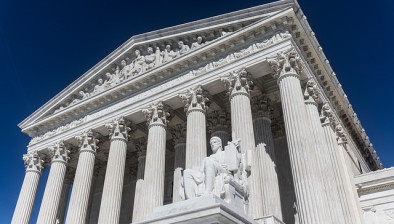Opinion: Ambitious emission reduction targets and carbon budgets for 2040 crucial for intergenerational climate justice

Dr Orla Kelleher
Dr Orla Kelleher of Maynooth University School of Law and Criminology calls on Ireland to show greater leadership and ambition on climate action.
We now have daily reminders of devastating climate impacts at current levels of temperature increase, which is already approximately 1.2°C above pre-industrial levels.
For example, Europe has experienced searing heatwaves in recent weeks which hit strikingly early in the summer season. The extreme heat has triggered forest fires, evacuations, school closures, limits on outdoor work, and widespread health warnings. There are already reports of at least eight heat-related deaths across Spain, France and Italy over the last few weeks alone.
To halt temperature increase and its devastating impacts, what matters is not just reaching net-zero by 2050. It’s staying within the remaining global carbon budget for +1.5°C and, failing that, limiting overshoot of this budget as much as possible.
Best estimates are that we have about three years of current emissions levels left before we exhaust our forever global carbon budget for +1.5°C.
These stark warnings should not cause us to throw in the towel. Every fraction of a degree of warming matters because every fraction of an increase in temperature exacerbates the risks.
The rapidly depleting budget should be a clarion call for new, bold measures that can rapidly and effectively close the gap between the level of emission reductions required and the current pace of delivery.
Our national and EU climate framework laws provide us with a strong legal framework for doing this in an orderly, just and fair way.
The European Climate Law makes specific provision for the European Commission to set an interim 2040 climate target. The Irish Climate Act goes a step further by having a system of carbon budgets explicitly linked to both the temperature goals and equity principles of the Paris Agreement.
Legally binding carbon budgets are one of the most effective legal instruments we have for constraining emissions because they impose hard legal limits on emissions within a five-year period. The law stipulates that if emissions are exceeded within a given five-year period, it is not possible to just write off the excess. The overshoot must be subtracted from the next budget.
To place this in context, at the end of 2025, the overshoot for Ireland’s first carbon budget is expected to be between 8-12Mt CO2 eq, roughly equivalent to all of Ireland’s transport emissions for the year 2023.
Setting interim targets or carbon budgets is a technically complex exercise. However, fundamentally, it is about levelling with the public. It is about being honest with people about how much of the remaining global carbon budget we are appropriating for ourselves. It is an exercise that raises profound ethical and political questions about how serious our governments are about safeguarding our children and grandchildren’s futures.
How much of the emission reduction burden and escalating impacts are we willing to saddle younger and future generations with? Which coastal regions or island nations are we effectively going to sacrifice and render uninhabitable due to irreversible sea level rise?
If we, as a society, are not willing to commit to rapid and deep emission reduction now, we need to be honest about the scale of carbon dioxide removals our children and young people will have to deploy to drag temperatures back down. We need to be honest about the real feasibility constraints and environmental risks associated with (for now) speculative technologies.
Carbon budgets are an opportunity for governments to be transparent with citizens about the radical mitigation actions and politically challenging choices that are now required to prevent the devastating climate impacts we are already experiencing from getting worse.
Climate advisory bodies have an important role to play in advising governments on these value judgments.
The European Scientific Advisory Board on Climate Change, in advising the European Commission on the EU’s 2040 target, provided a detailed assessment of the EU’s fair share of emissions based on different equitable principles. It recommended a target of a 90-95 per cent reduction in domestic emissions within the EU, complemented by measures outside the EU to achieve a fair share contribution to climate mitigation.
It made clear that based on some of these equitable principles the EU has already exhausted its fair share of the remaining global carbon budget. It has also repeatedly advised against using international carbon credits to meet the 2040 target because of the risk that they may not deliver real world emission reductions.
Similarly, the Irish Climate Change Advisory Council has played an significant role in developing proposals for Ireland’s first and second carbon budget programme.
However, serious concerns have already been raised by scientists and NGOs about whether the Council’s 2031-2040 proposal can truly be said to reflect Ireland’s fair share contribution to global efforts to remain within the 1.5°C threshold. International carbon credits have long drawn criticism for failing to result in real world emissions reductions and for implicitly enabling climate damaging projects to continue elsewhere.
The need for strong political commitment and communication has never been greater, yet political will appears to be waning.
After over a year of delay, the European Commission in the last few weeks proposed a new EU level emission reduction target of a 90 per cent reduction by 2040 relative to 1990 levels, the lowest end of the 90-95 per cent range recommended by the ESABCC. What’s more, the proposal will also allow for three per cent of the target to be met by international carbon credits, equivalent to 150 million tonnes of outsourced emission reductions.
Before the summer recess, both the Climate Change Advisory Council and the Minister for Climate appeared before the Joint Oireachtas Committee on Climate Action to discuss Ireland’s second carbon budgeting programme for 2031-2040. Disappointingly, equitable considerations like intergenerational climate justice and international solidarity have hardly featured in the debates so far.
Issues of equity and fairness are not just moral considerations — they are also legally enshrined obligations.
A close reading of the last year’s landmark KlimaSeniorinnen v Switzerland ruling of the European Court of Human Rights suggests that states have a positive human rights obligation to quantify a fair share domestic carbon budget.
The historic Advisory Opinion on climate change issued by the International Court of Justice in the last few weeks similarly recognised that national climate pledges must be capable of making an adequate contribution to the achievement of the primary temperature goal under the Paris Agreement of +1.5C. Adequacy in this context depends on a State’s historic emissions, level of development, and national circumstances.
Unfortunately, Ireland’s track record on emissions does not measure up well against any of these benchmarks. According to Ireland’s Climate Change Advisory Council, “Ireland’s historical warming impact is significant and comparable to other developed countries… If the rest of the world’s population had contributed to emissions to the same extent as Ireland, current global warming would be approximately 3.6°C”.
The Irish carbon budget process and EU 2040 target, which will continue into the autumn, are critical moments to turn things around. The first step is honesty with the public about the necessity of deep, rapid and sustained emission reductions now to secure a stable climate for younger and future generations.
It should not have to take further deadly heatwaves or devastating floods for our governments to commit to higher climate ambition. The time for leadership is now.
- Dr Orla Kelleher is an assistant professor of law at Maynooth University School of Law and Criminology. She is currently conducting engaged research on EU and Irish climate law on behalf of Environmental Justice Network Ireland.











